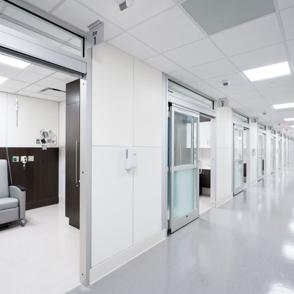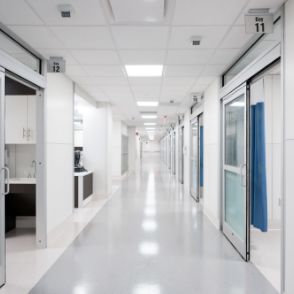Trends in adaptive construction are redefining healthcare spaces by addressing the increasing demand for more efficient and flexible facilities.
That’s because adaptive construction allows healthcare facilities to remain agile and responsive in the face of uncertainty.As we look to the future, further trends in adaptive construction are set to shape the healthcare environment and how we design and build healthcare facilities.
These practical solutions are already being implemented in cutting-edge projects across the healthcare industry. By understanding and leveraging these trends, healthcare providers can ensure their facilities are prepared to meet the demands of both today and tomorrow.
Embracing Uncertainity
One of the most significant shifts in construction thinking, particularly in healthcare, is the move towards embracing uncertainty. The COVID-19 pandemic highlighted the need for healthcare spaces to be adaptable and resilient in the face of sudden changes.
Key Benefits:
- Designing for Flexibility: Healthcare environments are now being designed with the understanding that needs may shift rapidly. This means creating spaces that can be easily adapted to different uses, such as converting general wards into isolation units or reconfiguring outpatient areas to handle increased patient volumes.
- Proactive Planning: Architectural Wallsz has been leading the charge in this area by incorporating flexible design principles that allow hospitals to swiftly adapt to changing circumstances to ensure they remain functional and effective under any conditions.
Modular Construction
Modular construction is a cornerstone of adaptive construction in healthcare. This approach, which involves the offsite fabrication of building components, offers many advantages, particularly in speed, flexibility and quality control.
Key Benefits:
- Speed of Deployment: One of the primary benefits of modular construction is the ability to quickly deploy new facilities or expand existing ones. Because much of the construction is completed offsite, it minimises disruptions to ongoing hospital operations and accelerates project timelines.
- Reconfigurable: Modular components can be easily reconfigured to meet changing healthcare needs. For instance, a modular ward can be quickly adapted into an isolation unit in response to an outbreak, or a general patient room can be transformed into a specialised care space with minimal disruption.
- Cost-Efficiency: Modular construction is often more cost-effective than traditional building methods. The ability to standardise components and reduce on-site labour helps keep costs down, making it an attractive option for healthcare providers looking to optimise their budgets.
Architectural Wallsz has been at the forefront of these trends by providing modular solutions that are designed to evolve with the needs of modern healthcare environments. As the demand for adaptable, scalable healthcare facilities grows, modular construction will continue to play a critical role in meeting these needs.
Technology Integration
One of the most important trends in adaptive construction is the integration of technology. It’s essential to integrate new technology into healthcare construction but the key is to ensure any technology is seamlessly integrated to enhance the functionality of the facility rather than complicate it.
Key Benefits:
- Smart Building Systems: Hospitals are increasingly incorporating smart systems that can monitor and adjust environmental conditions, such as lighting and temperature, in real-time to improve patient comfort and reduce energy use.
- Patient-Centric Technology: Technology is also being integrated into patient rooms, enabling more personalised care. For instance, rooms equipped with smart beds and monitoring systems can automatically adjust settings to optimise patient recovery.
Sustainable Building Projects
The drive toward more sustainable building practices is another significant trend in adaptive construction, with a focus on reducing environmental impact while creating healthier spaces for patients and staff.
Key Benefits:
- Energy Efficiency: Sustainable healthcare facilities prioritise energy efficiency and use technologies such as solar panels, energy-efficient HVAC systems and advanced insulation to reduce energy consumption. These practices not only lower operational costs but also contribute to a healthier environment.
- Sustainable Materials: The use of sustainable, non-toxic materials is crucial in healthcare construction. Materials that resist microbial growth, improve air quality and are easy to clean are becoming standard in modern hospital design.
- Waste Reduction: Modular construction inherently supports waste reduction by minimising material waste during the manufacturing process. Additionally, buildings designed with adaptability in mind can be reconfigured rather than demolished, further reducing waste.
Trends that Futureproof Healthcare Spaces
Trends in adaptive construction are paving the way for more responsive and efficient healthcare environments.
From the integration of smart technologies that enhance patient care and operational efficiency, to the quick and flexible deployment of modular construction and the commitment to sustainable building practices, these trends are setting new standards for what healthcare facilities can achieve.
As leaders in this field, Architectural Wallsz is dedicated to helping healthcare providers navigate these trends and create facilities that are ready for whatever the future holds. Whether you’re planning a new healthcare facility or looking to upgrade an existing one, our team is here to help you implement the latest in adaptive construction practices.
Get in touch with Architectural Wallsz today and discover how we can help you create a flexible, sustainable and smart healthcare environment.






Sorry, the comment form is closed at this time.